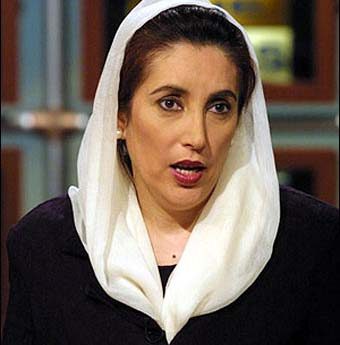|
 By Faisal Shakeel By Faisal Shakeel
The investigation report of the United Nations Commission on former premier Benazir Bhutto's assassination mirrors the fears she narrated in her book Reconciliation, Islam and the West.
The Commission report blames the Musharraf government for Benazir's murder, underlining several flaws, ranging from inadequate security on the day of the incident to a comprehensive, post-assassination plan to spoil vital evidence.
On two occasions Bhutto, forewarned by a friendly country of the perils of returning home, stated in her book that people in the inner circle of Musharraf’s government posed a threat to her life.
Where she made no bones about her meetings with Musharraf during the negotiations preceding her return, she also provided details of the strange occurrences swirling around the caravan carrying her from the Quaid-i-Azam Airport in Karachi.
She wrote a letter to Musharraf with the names and even addresses of the potential plotters and assassins. Some of the details of the letter were published in daily newspaper Dawn.
She believed the deliberate power outages on the route of the caravan were an attempt to blindside the security for the launch of a deadly attack. And then the attack did occur, maiming innocent people and young men, who had formed a human chain around the armoured truck. The friendly country’s warnings turned out to be true.
Later, in Rawalpindi, Bhutto was assassinated in a gun-and-bomb attack. The material in her book and later the hosing down of the scene of her assassination formed sufficient basis for initiating an investigation to catch the killers.
But for some reason it was not done until the government requested the UN Commission to initiate a probe.
The commission’s mandate had been to ascertain the facts and circumstances leading to her assassination, but it did underline certain irregularities which could easily have been spotted by an investigator at home.
Why then bring in the commission? One obvious reason had been to create a justification for launching an investigation to offset the influence of the ‘establishment’, which the UN commission refers to in its report.
Pakistanis know the establishment as a mix of intelligence agencies, military officials and bureaucracy - the elite that rules the country from the front after grabbing power, and never desists from hatching conspiracies against democracy to return from the dark.
As soon as the report came out, columnists started interpreting it way beyond its context. Different articles appearing in newspapers stretched their imagination to the point of absurdity in an attempt to prove their diction and outsmart Sherlock Holmes.
From declaring it an attempt to politicise the establishment as a hideous pack of conspirators to a derision of the intelligence agencies of Pakistan, the report has become a basis for churning out theories.
The report says what it says. It says the security at the venue was lax and deliberate attempts were made to remove the killers’ trail. It says even those within Bhutto’s party acted suspiciously.
It is a fact that her party members - Babar Awan, Rehman Malik and Farhatullah Babar - left the venue before the attack on the black Mercedes, which was following the former premier’s vehicle as an alternative in case of emergency. Mr Awan and Mr Malik are now federal ministers while Mr Babar serves as the spokesman of President Asif Ali Zardari.
The very fact they were not investigated makes their role even more suspicious. Mr Malik, now Interior Minister, was tasked with supervising the security of the former premier killed in cold blood.
The series of ‘mistakes’ in the whole assassination affair serves like pieces of a jigsaw puzzle, which could be put together almost effortlessly. The investigation, lodged after the commission report noted the hosing down of the scene of the assassination, is continuing with intriguing twists.
A senior police official, Saud Aziz, who was responsible for collecting evidence from the crime scene after sealing it off, admitted during the investigation that he ordered his sub-ordinates to scrub the spot clean.
He denied allegations that a senior military official, Maj General Nadeem Ijaz, ordered him to hose down the crime scene. Instead, he said his act of sending the evidence down the drain was an error of judgment, arising from the need to control the crowd. What a classic excuse!
Police officials are trained to preserve evidence, not waste it. Strip the case of the follies and excuses and you have the killers.
|



